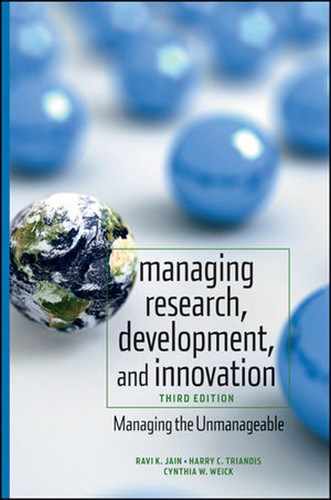15.1. BASIS FOR UNIVERSITY RESEARCH ACTIVITIES
There is considerable debate about the role and purpose of research and scholarly activities in research-intensive universities. It is suggested that the research grant at a university has become the true badge of honor and that the faculty member who devotes primary energy and creativity to teaching is in fact penalized and often looked down upon by peers (Griffiths, 1993). It is well known that promotion and tenure decisions at universities are greatly affected by a faculty member's accomplishments in research, and these accomplishments are to a great degree affected by research grants. Thus, research grants become the driving forces for faculty recognition and promotion. As an example, one dean refused to promote a biologist who did not have outside support on the grounds that tenure commits $1 million to a professor's career, and making such a commitment is too risky if the federal government is not participating financially.
A comprehensive university is more than a teaching college. A university is a repository of new knowledge. Scholars at a university generate new knowledge and participate in disseminating this knowledge through teaching and research publications. The university community also participates in many outreach and service activities.
Quality graduate education is undoubtedly linked to research and scholarship. The American higher education system is unique in that the education of scientists and engineers takes place at academic institutions where basic research is undertaken and thus new knowledge is generated. Research in academia, therefore, serves the most crucial purpose of educating the next generation of scientists and engineers.
A clear connection between academic research and commercial use of technology and innovation is difficult to establish. In a recent study Mansfield (1995, p. 64) concluded, "a substantial proportion of industrial innovation in hightechnology industries like drugs, instruments, and information processing have been based directly on recent academic research."
To clearly understand the importance of research to a university, imagine the implications of a precipitous decline in external research funding at a university.
At the outset, there would be an immediate impact on all budgets. Why? Simply because, at most research-intensive universities, external research funding represents more than 50 percent of the budgets of science-and-technology-based departments and colleges within the university. Much of the research infrastructure at a university is supported by external research funding. The effect on such research infrastructure would be considerable. This would, in turn, affect the quality of the graduate program. Since many of the graduate students in science and engineering are supported from external research funding, the number of graduate students would decline.
Many faculty members draw supplemental compensation for summer research activities from research grants. This is an important issue. First-rate faculty members are naturally drawn to research-intensive universities where they can work on significant research programs and are usually able to augment their normal academic salaries with funds drawn from research grants. Thus, a decline in external funding would inevitably affect the faculty quality at a given university and, in turn, affect the program quality and reputation, especially at the graduate level.
One could argue that undergraduate programs benefit from high-quality faculty and that a decline in the research funding would also affect the quality and reputation of the undergraduate program. Finally, many outreach programs and service through innovation would be adversely affected if the research funding were to decline.
Many crucial decisions affecting faculty promotion and tenure, program quality, and the reputation of a university are all inextricably tied to external research funding. For universities that are not research-intensive, arguments presented here may not be as relevant.
Notwithstanding all of these points, arguably, research in academia is best justified to support the institutions' primary mission of education, generating new knowledge, and service.
Walter Massey, former director of the National Science Foundation (1994, p. 201), has stated, "Commitment to scholarship and research is what distinguishes the research university from other types of institutions, but it does not define them." He further suggests that the primary mission of a research university still is to educate and it is this mission that an academic institution needs to focus on. Research and scholarship in an academic institution should be undertaken to support excellence in teaching and service.
